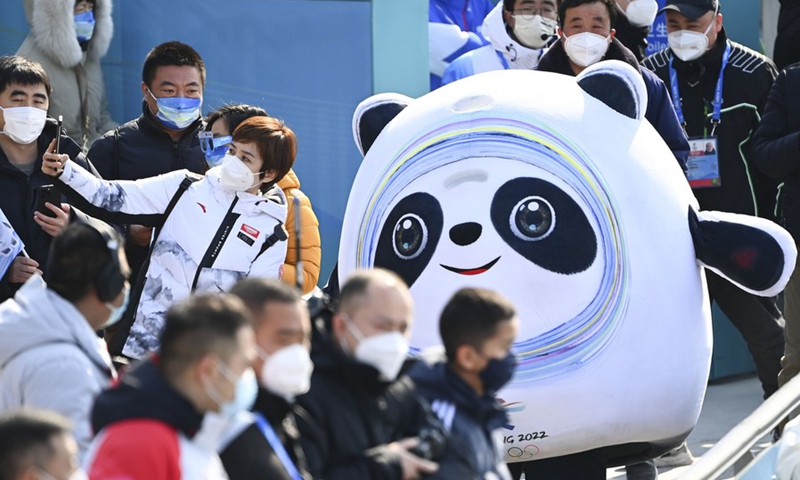
An audience takes selfies with Bing Dwen Dwen, the mascot of Beijing 2022 Olympic Winter Games, during the freestyle skiing men's freeski big air final at Big Air Shougang in Beijing, capital of China, Feb. 9, 2022. (Xinhua/Li He)
Beijing Winter Olympic Games were held and ended successfully - which was emphasized by the solemnly held closing ceremony. Having held the Winter Olympics, China has once again established its image in the world, which neither the propaganda campaign around the sources of the COVID-19 pandemic, nor the pedaling of individual issues from the "domestic political agenda" could shake. The basis for this campaign was the statement of the US State Department, made back in January 2021, concerning the "systematic infringement" of the rights of Uygurs. American initiatives were supported by five countries from among the "junior partners" in NATO - however, even the semblance of an obstruction to the Olympic tournament did not work for Western countries this time. The overall success of China - third place in the gold medal tally, surpassing the US and a number of other traditionally strong countries in winter sports - emphasized the new status of a dynamically developing power on the world stage.
Having successfully held the Winter Olympic Games, China has declared its own understanding of the policy of openness in a global world experiencing a series of acute crises. Openness to all countries ready for mutually beneficial cooperation in various fields, openness which presupposes readiness for dialogue on all key issues on the global agenda (and not only sports) without imposing one's own point of view and interpretations by any one country.
And the symbol of this "new openness" was the performance at the Winter Games of American-born Eileen Gu, a freestyle skier in halfpipe, slopestyle and Big Air, who has been playing for Team China since June 2019. The peak of her sporting success was the Beijing Winter Olympics, which brought her two Olympic gold medals and one silver. At the Games, Gu became a kind of symbol of youth and success.
Another circumstance is also significant - Gu was born and raised mostly in the US. Her mother and grandparents who are Chinese raised her, and she speaks Chinese and English fluently. In March 2021, Gu said that since she was 15, she had faced hostility over her decision to compete for Chinese team, including death threats and "endless hatred" on social media - which barely abated amid her success at the Winter Olympics. However, no defamation stopped the young and talented athlete on the way to success - which also became very symbolic in the context of the processes taking place today.
In the end, the main foreign policy success of China, which became obvious in connection with the Olympic Games, is a clear demonstration of the loss of Western countries by means of propaganda and public-political pressure to impose their own understanding of the meaning and significance of events taking place in the world, regardless of the opinion and interests of other stakeholders. The loss of dominance in the public sphere by Western countries especially the US is a truly significant event that entails significant changes in world politics and in the structure of international relations.
The main reason for what is happening is that the US is gradually losing the resources that allow it to remain a superpower. At the same time, the declining economic (and innovative) power in comparison with other developed and developing countries today requires the US to revise its own attitudes and positions. But the US is often not ready - this causes such a sharp and unconstructive reaction to international sporting events, including the Olympic Games. In addition, it should be remembered that support within the US itself for policy of maintaining the status of a superpower has never been too significant, which gave rise to repeated splits in politics and public opinion.
There was also no absolute support for the American "mission" from the allies - the same EU has long recognized the hegemony of the US, periodically showing dissatisfaction with its dependent position, which is evident today, as Washington seeks to create a "global coalition" to contain its geopolitical competitors. No less important is the fact that the US has also lost the moral and psychological resource that allows it to be a world leader - many countries of the world have stopped perceiving American exceptionalism and the mission to "guide the world," and do not want to "wish for what the US wants." The latter can be explained by the allergic reaction of the US to the successes of other countries in all major fields of activity, including professional sports.
America's problem also lies in the fact that the US does not take into account many issues from the global agenda, the solution of which seems to them incompatible with the American way of life. This often prevents them from being a reliable and responsible partner on issues that really concern the world community. Due to this, the mere participation of the US in the most significant areas of international politics is not enough. The main problem is that American foreign policy has ceased to be an attractive model for other countries. Major world sports forums, such as the Winter Olympics in Beijing, only further emphasize this fact.
Washington is gradually losing its so-called moral leadership in world politics, having lost the ability to offer new values to the world community, as well as the ability to comply with the signs previously declared by them.
Beijing Winter Olympic Games, which objectively went beyond a purely sporting event in the context of modern international processes, lead us to all these reflections. Because international sports events, despite all the upheavals that are taking place, while remaining a platform for dialogue between different countries, certainly reflect the changes taking place in world politics.
The author is a professor at the Siberian Institute of Management in Novosibirsk of Russia. opinion@globaltimes.com.cn




